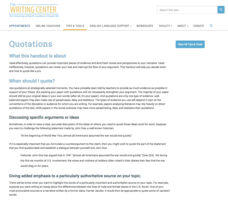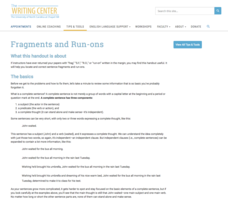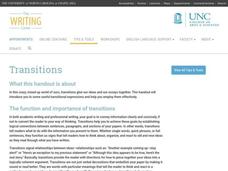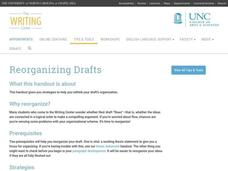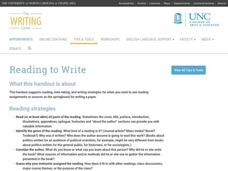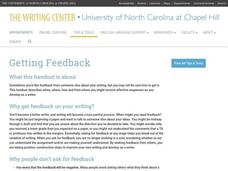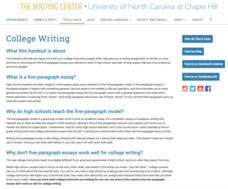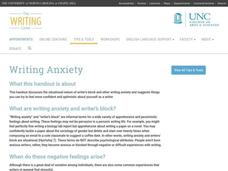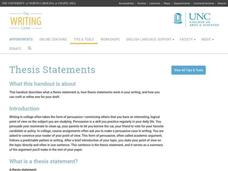University of North Carolina
Quotations
According to A.A. Milne, "[A] quotation is a handy thing to have about, saving one the trouble of thinking for oneself." However, as part of a larger series of handouts discusses, quotations also have the ability to enhance a piece of...
University of North Carolina
Gender-Inclusive Language
In the past, if writers weren't sure of a person's gender, they simply used masculine pronouns. Today, however, as a handout on gender-inclusive language explains, writers must choose pronouns carefully. To promote the use of gender...
University of North Carolina
Fragments and Run-ons
English teachers around the world cringe when they come across fragments and run-ons in papers. A handout on these poor imitations of sentences helps bring relief by reviewing the basics of sentence construction and by offering...
University of North Carolina
Commas
Every time you pause while reading, you should insert a comma, right? Not necessarily. Using a comma to indicate a pause is just one of the myths addressed in a handout related to the pesky punctuation mark. After reviewing common...
University of North Carolina
Citation Builder
Does the publication date come before or after the title? Should there be a comma between the location and year? The answer depends on whether you're using the MLA, APA, Chicago,4or CSE/CBE style guide. A citation builder clears up...
University of North Carolina
Articles
English might be a tough language to learn, but at least all words have a specific purpose! A handout from The Writing Center at UNC outlines the purposes of articles in the English language. Discover which types of nouns need articles...
University of North Carolina
Qualifiers
A lot of writers really struggle very much with adding a lot of qualifiers and intensifiers in their writing. Part of a larger series to improve writing skills, a handout on the topic provides tips to help reduce a reliance on these...
University of North Carolina
Modals
If you could have any job in the world, what would it be? Modal verbs such as could and would express possibility, as the installment of a compilation of informational handouts describes. A series of tables help explain the strength,...
University of North Carolina
Latin Terms and Abbreviations
N.B.. cit., n.b., viz., sc., inf. e,g,—these abbreviations frequently appear in academic papers and on works cited lists, but what do they mean? Part of a larger series to improve writing skills, the handout on Latin terms and...
University of North Carolina
Editing and Proofreading
Writing is not a one and done process. In fact, the stages of editing and proofreading, the focus of a flyer from a larger set of writing skills handouts, play a major role in creating a strong paper. However, as the reference sheet...
University of North Carolina
Conciseness
Twitter has helped people learn to express their ideas in as few words as possible, but away from the 280-character limit, writers still struggle with keeping their writing short and to the point. Conciseness is the focus of a writing...
University of North Carolina
Clichés
When it comes to writing, cliches are as old as dirt. A handout on tired phrases provides examples of cliches, as well as a description of the negative effects they have on a paper. Writers discover specific words and phrases to avoid,...
University of North Carolina
Understanding Assignments
"What do we have to do again?" Chances are you hear this question all the time. Here's a handout that offers scholars tips on how to understand college writing assignments. Class members learn strategies to help them decode assignments...
University of North Carolina
Transitions
Ideas don't naturally flow from one to another. They need transitions to help them connect. Part of a larger Writing the Paper series, the resource introduces writers to the concept of using transitions in their writing. Topics covered...
University of North Carolina
Reorganizing Drafts
Poor organization often destroys an otherwise good paper. After writing a first draft, individuals consider the organization of ideas, a topic discussed in the 16th handout in the 24-part Writing the Paper series. The resource covers...
University of North Carolina
Reading to Write
Silly journal and essay prompts may be fun to write, but they don't model the kind of writing needed for college papers and standardized tests. The 15th part in a series of 24 covers the concept of reading to write—during and after...
University of North Carolina
Paragraph Development
There's no set length for a good paragraph, but the short block of text should contain key components. A handout on paragraphs, the 12th in a series of 24, outlines a five-step process for paragraph development. Additionally, the handout...
University of North Carolina
Getting Feedback
As many writers know, you are your own worst editor. The 10th installment in the Writing the Paper series explains that getting feedback from others is crucial to the writing process. The handout highlights the best time to ask others to...
University of North Carolina
Evidence
You can claim that soda rots people's teeth or that dinosaurs were actually birds, but your claim will not stand up if it is not backed by evidence. A handout from UNC Writing Center, the seventh in the Writing the Paper series of 24,...
University of North Carolina
Conclusions
If you see phrases such as in conclusion or this is my paper about, you know you're about to read a poorly worded conclusion. A tip sheet, the fifth resource in a series of handouts to improve writing, helps scholars craft better...
University of North Carolina
College Writing
No matter how difficult high school writing may seem, college writing presents challenges of its own. The fourth in a series of 24 handouts from The Writing Center at UNC breaks down the expectations for college writing. Scholars learn...
University of North Carolina
Writing Anxiety
Oh, the dreaded writer's block! As part of a larger paper-writing series, an invaluable resource discusses obstacles and stresses writers face. Individuals learn to identify feelings associated with anxiety, as well as strategies for...
University of North Carolina
Thesis Statements
Phrases such as "This paper is going to be about" and "I am going to tell you about" do not make for effective thesis statements. A handout from the UNC Writing Center helps writers break from those phrases to craft effective thesis...
University of North Carolina
Summary: Using it Wisely
Sometimes summarizing keeps a writer from going deeper into their analysis—don't fall into that trap. Learn the difference between summarizing and analyzing using an insightful resource. Focusing on introductions, the lesson shares...


